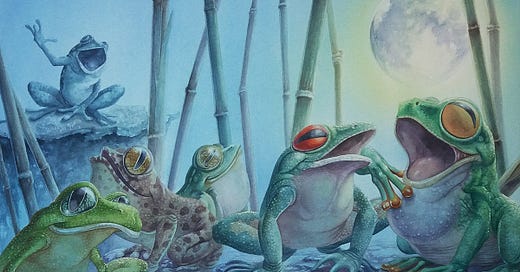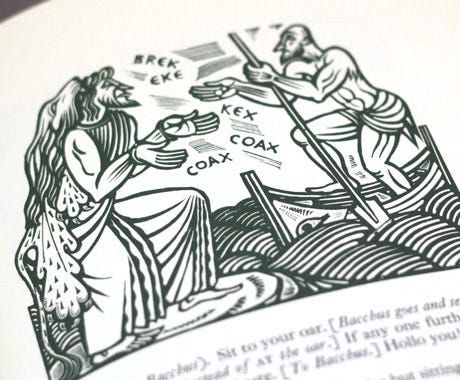Can You Stop a War with Frogs?
One Ancient Comedian's Attempt to End the Bloodshed with a Croak...
Dear Classical Wisdom Reader,
What do you reckon, noble or naive?
They say the pen is mightier than the sword, or least that’s what Edward Bulwer-Lytton said in 1839, when he was trying to take down Cardinal Richelieu with the following words:
Beneath the rule of men entirely great
The pen is mightier than the sword. Behold
The arch-enchanters wand!— itself a nothing!—
But taking sorcery from the master-hand
To paralyse the Cæsars—and to strike
The loud earth breathless!—Take away the sword—States can be saved without it!
Sounds good… saving folks without violence is surely the way! But… does it work?
The old Attic poetic comedian, Father of Comedy and son of Philippus, certainly thought so. Known for his biting remarks, his slanderous representations, contagious wit and ridiculous circumstances, Aristophanes attempted to end the war that sought hegemony of the Greek world…. with frogs.
Read on to learn of the Play -and its efforts- to stop a war, below.
All the best,
Anya Leonard
Founder and Director
Classical Wisdom and Classical Wisdom Kids
P.S. the Power of Stories is remarkable… but how has storytelling shaped our history, our culture, our current lives?
This March 4th, Classical Wisdom and Civic Renassiance are putting together a multidisciplinary summit, with authors and actresses, philosophers and photographers, sociologists and world renowned speakers, all with the aim of understanding the power of storytelling.
Aristophanes’ The Frogs: A Way to Stop a War?
By Jocelyn Hitchcock, Contributing Writer, Classical Wisdom
The Frogs, an ‘old’ comedy play by Aristophanes, was performed in 405 BCE at the Lenaia festival of Dionysus. With the Peloponnesian War raging on, plays of the time had a tendency to deal with saving the state, matters of right and wrong, and background events of the war itself. Writers focused on political themes, pushing the idea that a poet has the ability to save the state from war.
But did it?
The Plot of Aristophanes’ The Frogs
Originally disguised as Heracles, the god Dionysus ventures down to the underworld to seek out Euripides, the tragic poet who had died in the previous year. Against the backdrop of war, Dionysus thinks that Euripides is the only one who can save Athens from itself. Dionysus crosses the lake with Charon while debating with a chorus of frogs along the way.
Soon, the issue of Dionysus’ disguise as Heracles presents itself when he realizes Heracles made a few enemies in the underworld. Accompanied by his slave, Xanthius, Dionysus makes him wear the costume instead. Then Xanthius, dressed as Heracles, gets invited to a banquet of feasting and dancing. Dionysus, not surprisingly, wants to be the one at the banquet so they swap clothes yet again. However, at the banquet Dionysus dressed as Heracles makes even more people mad, so they switch again. This whole first half of the play is mostly Dionysus’ fumbling with choices, making Xanthius cover for him and improvising to right his wrongs.
As the play progresses, Dionysus finds himself in the palace of Pluto where Aeschylus and Euripides are competing for the best tragic poet. Dionysus acts as the judge while Aeschylus and Euripides quote snippets of their verse, critique, and respond to one another. In the final judgment of the debate, a scale is brought in and whichever poets’ words have the most weight to them will cause the scale to tip in their favor.
Ultimately, this measuring device proves ineffective and Dionysus asks the battling poets to provide advice for how to save the city. In the end, Aeschylus proves to be more practical and suited for the job, so Dionysus chooses to take him back to earth.
Key Themes in Aristophanes’ The Frogs
In this play in particular, Aristophanes unequivocally posits that it is the poet’s duty to save the city. However, this is fully dependent on defining who is the right poet, who has the right ideas, and who makes the right decisions. This is expressed through a series of choices, disguises, and deceptions throughout the play. Dionysus is the butt of the jokes in the first half of the play, constantly going back and forth with Xanthius and constantly making the wrong choice.
In the second half of the play, Dionysus transitions into a stoic, perceptive judge of others. His final choice of Aeschylus is left up to the audience to decide whether or not it was the right decision. Aristophanes also leaves the success or failure of Aeschylus to save the city open-ended. Aristophanes is intentionally ambiguous and subtle, which the audience no doubt would have picked up as a larger comment on the present day backdrop of war. Aristophanes manipulates the reality that his plays are set against, providing audiences a transcendent view of truth.
The Reception of Aristophanes’ The Frogs
Having won the contest in 405 BCE, the Frogs was a comedic hit from the beginning. Some sources even suggest that Athens commissioned in the same year for the play to be put on again. The Frogs is also commonly performed in modern day theaters, being adapted into musical form as well. The onomatopoeia of the frog croak, witnessed in the choral ode of the play, has been used in Finnegans Wake by James Joyce, and was referenced in Jesting Pilate by Aldous Huxley.
It is clear that Aristophanes’ The Frogs was a great success. The fact that the raging Peloponnesian War ended the year after, however, probably didn’t have much to do with it, despite the Poet’s best attempts.







I love this! I HAD to read it because my Xbox handle is FrogsOfWar. 🤣
Entertaining and accurate